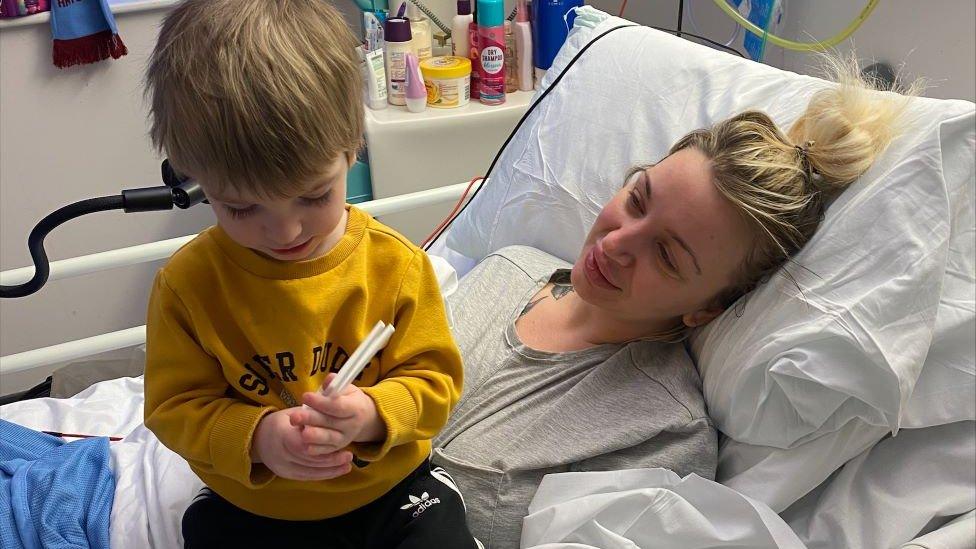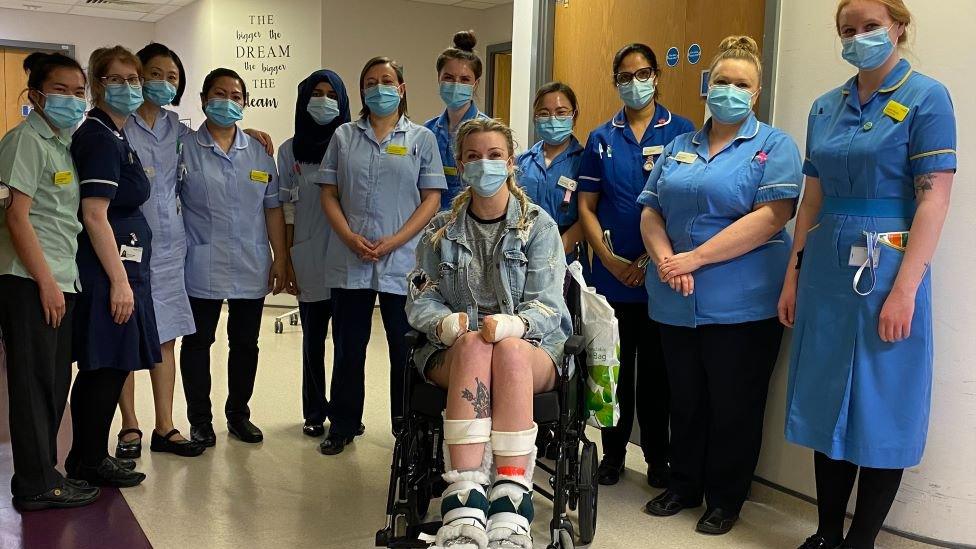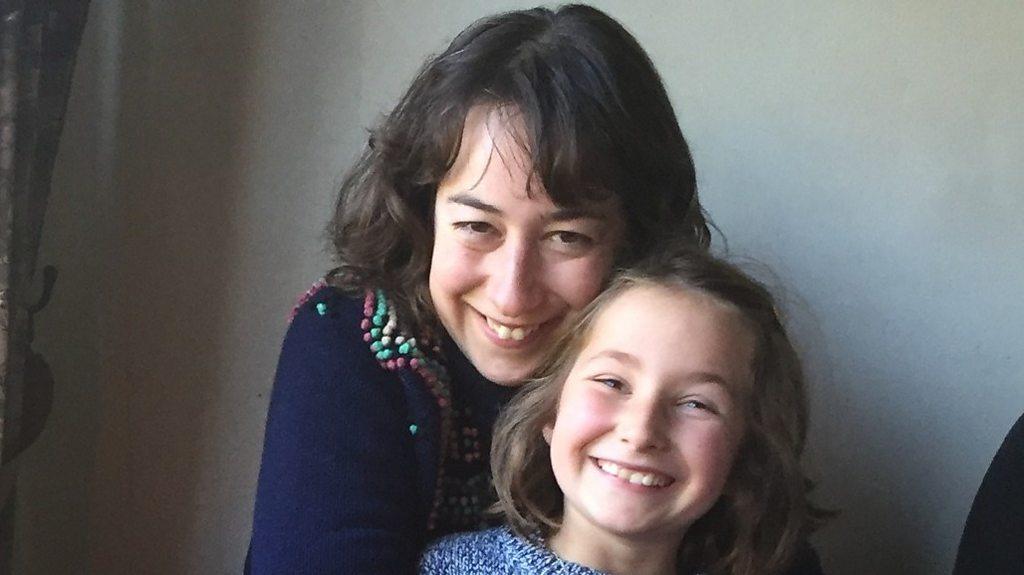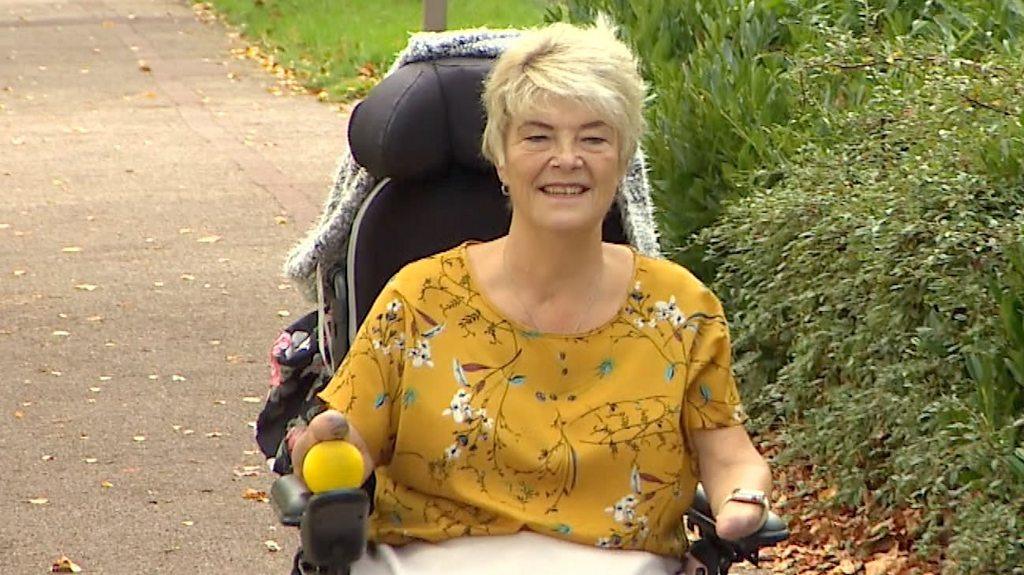Mum's sepsis warning after diagnosis delay at Cambridgeshire hospitals
- Published

A report form the hospital trust where Sadie Kemp was treated highlighted multiple issues with her care
A mother-of-two had "extensive amputation surgery" after a hospital trust failed to recognise and treat her sepsis sooner, an investigation found.
Sadie Kemp, 35, spent 103 days in hospital after falling ill on Christmas Day but signs of sepsis were not initially investigated.
Ms Kemp, from Sawtry, said it was "vital lessons are learned".
The trust which runs Hinchingbrooke and Peterborough hospitals said an inquiry was ongoing into Ms Kemp's care.
Since her diagnosis Ms Kemp has had all 10 fingers amputated and her legs at the ankles.
Ms Kemp, who has been sharing her story on TikTok, had gone to A&E at Hinchingbrooke Hospital with severe back pain but was sent home and told to return the next day for tests. However, she returned hours later in the early hours of Boxing Day having deteriorated at home.
Later that night clinicians noted a deterioration in her condition but there was no evidence of a sepsis screening being performed for another three-and-a-half hours, the report said.

As a result of her sepsis Ms Kemp has had all her fingers amputated and had both legs amputated at the ankle - the procedure aims to save more of her leg and sees a prosthesis directly into the body through the bone
She was transferred to Peterborough City Hospital on 27 December where she required surgery for a kidney stone.
However, the report found "due to the sepsis not being recognised and treatment commenced sooner" she had to be stabilised before undergoing surgery.
It added "the lack of effective treatment" prior to surgery meant Sadie needed prolonged critical care treatment.
'Angry and emotional'
She then developed gangrene in her fingers and toes "which has resulted in extensive amputation surgery and subsequent permanent disability," the report stated.
Ms Kemp said: "All I can remember was being in absolute agony because of the pain and the next thing I'd woken up in intensive care."
She said nearly a year later she is "still trying to get my head around what happened and why it did."
Doctors had told her she was "lucky to be alive" and she feels indebted to critical care staff she said.
However, she said: "It's difficult not to try and be angry and emotional by what happened to me before and the issues in my care that have been highlighted."
Sepsis survival story attracts 500,000 TikTok fans
'Rollercoaster of emotions'
"The last few months have been a real rollercoaster of emotions. The support I've had from my family and friends has given me real strength to try and face the future."
She said it was "vital that lessons are learned" from her case.
"I want to be there for my kids, look after them and give them the best future I can," she said.
"Sepsis is an absolutely horrendous condition and more has to be done to raise awareness of how dangerous it is. I just hope that by speaking out I can help others."
Ms Kemp has instructed medical negligence lawyers to help her and is calling for lessons to be learned while also raising awareness of the dangers of sepsis.
Amie Minns, a lawyer at Irwin Mitchell representing Ms Kemp said: "Understandably Sadie has had a number of concerns about what happened to her with the hospital trust's investigation report finding extremely worrying issues in her care."

She said her legal team would "continue to investigate" to provide Ms Kemp "with all the answers she deserves".
She called on the trust to "resolve these concerns as quickly as possible".
Ms Kemp has been fundraising for her leg surgery as it is not currently available on the NHS - the procedure aims to save more of her leg and would see a prosthesis directly connected to the bone.
A spokesperson for North West Anglia NHS Foundation Trust, which runs Peterborough City Hospital and Hinchingbrooke Hospital, said an investigation into Ms Kemp's care was ongoing and it would be inappropriate to comment further at this time.

What is sepsis?
Sepsis is also known as the "hidden killer" because it can be so hard to detect.
It is caused by the immune system going into overdrive. Instead of just fighting an infection, it starts attacking other parts of the body too.
Ultimately it causes organ failure. Even survivors can be left with long-term damage and disability.
Bacteria and viruses that cause diarrhoeal infections or lung diseases are the leading triggers of sepsis.
In 2020 a comprehensive analysis of sepsis found it causes one in five deaths in the world.
Sepsis: What is it - and how to spot it?
What are the symptoms of sepsis?
In adults:
slurred speech
extreme shivering or muscle pain
passing no urine in a day
severe breathlessness
high heart rate and high or low body temperature
skin mottled or discoloured
In children:
a mottled, bluish or pale appearance
very lethargic or difficult to wake
abnormally cold to touch
breathing very fast
a rash that does not fade when you press it
a seizure or convulsion

Find BBC News: East of England on Facebook, external, Instagram, external and Twitter, external. If you have a story suggestion email eastofenglandnews@bbc.co.uk
- Published24 April 2022

- Published6 October 2022

- Published3 May 2022

- Published8 November 2022

- Published13 October 2022
